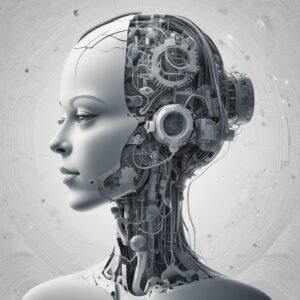Introduction to AI in Healthcare
The integration of artificial intelligence (AI) into the healthcare sector marks a significant evolution in how patient care and medical research are approached. AI encompasses a range of technologies, including machine learning, natural language processing, and data analytics, all of which are increasingly employed to enhance various aspects of healthcare delivery. The significance of AI stems from its potential to analyze vast amounts of data quickly and accurately, thereby providing insights that were previously unattainable. This capability allows healthcare professionals to make more informed decisions, ultimately leading to improved patient outcomes.
Initially, the applications of AI in healthcare were primarily limited to administrative tasks and data management. For example, AI technologies have been utilized to streamline hospital operations, optimize scheduling, and manage medical records. However, as the technology has advanced, its applications have expanded significantly. AI is now being used to assist in diagnosing diseases, predicting patient risks, and even personalizing treatment plans based on an individual’s genetic makeup. These early implementations demonstrate AI’s transformative potential in easing the burden on healthcare providers while enhancing the quality of care delivered to patients.
Moreover, the trend of AI adoption has gained considerable momentum among healthcare providers, driven by the increasing demand for efficient, data-driven solutions. Many healthcare organizations are recognizing that incorporating AI not only facilitates streamlined processes but also leads to cost savings and enhanced patient satisfaction. As a result, patients can expect to benefit from innovations such as quicker diagnoses, more accurate treatment recommendations, and tailored care plans that reflect their unique health profiles. The ongoing evolution of AI technology suggests that its role in healthcare will only continue to expand, paving the way for a future where patient care is increasingly precise and efficient.
AI-Powered Diagnostic Tools
Artificial Intelligence (AI) has emerged as a transformative force in healthcare, particularly in the development of advanced diagnostic tools. These tools harness machine learning algorithms and data analytics to improve diagnostic accuracy and efficiency across various clinical settings. For instance, AI-powered imaging analysis algorithms are revolutionizing how radiologists interpret medical images. These algorithms can process vast amounts of data quickly and identify abnormalities with a level of precision that often surpasses human capabilities.
One prominent example is the use of AI in mammography screening. Studies have shown that AI algorithms can reduce false positives and enhance the detection of breast cancer, leading to better patient outcomes. By analyzing mammograms for subtle patterns and anomalies that may be missed by the human eye, these tools facilitate earlier interventions, which is critical in improving survival rates.
Moreover, symptom checker applications equipped with AI capabilities are becoming increasingly popular among patients. These tools allow individuals to input their symptoms and receive preliminary assessments based on a vast database of medical knowledge. For instance, the AI-driven Symptom Checker by companies like Babylon Health has demonstrated significant effectiveness in triaging patients appropriately, leading to quicker decision-making regarding the need for further medical evaluation.
Real-world case studies illustrate the effectiveness of AI-powered diagnostic tools in practice. In a clinical trial involving an AI imaging tool for lung cancer detection, results indicated that the machine outperformed radiologists in identifying early-stage tumors, showing promise in adopting AI technologies within everyday healthcare practices. Additionally, by alleviating some of the burdens faced by healthcare professionals, these tools enable them to focus on patient care rather than the overwhelming administrative workload.
Ultimately, the integration of AI-powered diagnostic tools not only enhances the accuracy of diagnoses but also contributes to a more efficient healthcare system, benefiting both patients and healthcare providers alike.
Transforming Drug Discovery Through AI
Artificial Intelligence (AI) is redefining the landscape of drug discovery by streamlining processes and enhancing precision. In recent years, AI algorithms have emerged as a powerful tool for analyzing extensive biomedical data, enabling researchers to uncover patterns and insights that would be nearly impossible through traditional methods. By harnessing the capabilities of machine learning and data analytics, pharmaceutical companies can now predict drug interactions more accurately and efficiently identify potential candidates for new therapies.
One of the significant advancements AI brings to drug discovery is its ability to process massive datasets rapidly. This not only accelerates the identification of viable drug candidates but also significantly reduces the cost associated with the development process. According to a report by a leading industry research firm, AI-enhanced methodologies have reduced the timeline of drug development by up to 30%, translating into significant financial savings. In addition to speeding up the research timeline, AI technologies can help minimize the high failure rates associated with drug trials, which historically have impeded advancements in this field.
Numerous notable success stories underscore the potential of AI in drug discovery. For instance, an AI-driven approach led to the rapid development of a treatment for a rare genetic disorder, demonstrating how machine learning algorithms can analyze genetic data and produce new therapeutic candidates swiftly. Additionally, AI is increasingly utilized to repurpose existing medications, finding new applications that can improve patient outcomes in various conditions.
Despite these advancements, challenges remain in integrating AI into mainstream drug discovery. Issues such as data privacy, the need for robust validation of AI-generated predictions, and the integration of diverse data sources must be navigated carefully. The collaboration between technologists and healthcare professionals is vital to ensure AI’s successful adoption, ultimately enhancing drug discovery and delivering innovative therapies to patients.
Personalized Medicine Applications
In recent years, personalized medicine has emerged as a revolutionary approach in healthcare, fundamentally altering how treatments are designed and administered to patients. Central to this transformation is the application of artificial intelligence (AI), which plays a crucial role in tailoring medical interventions based on an individual’s unique genetic profile, health data, and lifestyle factors. By leveraging advanced algorithms and vast datasets, AI enables healthcare professionals to move away from a one-size-fits-all approach, instead focusing on precision medicine.
One notable application of AI in personalized medicine is genomics analysis. Through the examination of patients’ genetic information, AI can identify specific mutations and variations that influence disease susceptibility and treatment responses. For instance, AI-powered tools can analyze genomic sequences to discern which patients are likely to benefit from targeted therapies, particularly in fields such as oncology. A prominent example is the use of AI in determining the most effective treatment for lung cancer patients based on their genetic markers. This allows for the selection of therapies that are more likely to succeed, potentially improving patient outcomes significantly.
Another key area where AI is instrumental is patient stratification. By employing machine learning techniques, healthcare providers can classify patients into subgroups based on shared characteristics or predicted responses to treatments. This process enhances the ability to identify the most suitable interventions for each patient, optimizing resource allocation and healthcare efficiency. However, the integration of AI in personalized medicine raises important ethical considerations, such as data privacy, informed consent, and potential biases in algorithmic decision-making.
In conclusion, the rise of personalized medicine, facilitated by AI, signifies a promising advance in patient care. As we continue to explore its applications, it is vital to navigate the associated ethical implications, ensuring that this powerful technology serves all individuals effectively while paving the way for a more tailored approach to healthcare in the future.




